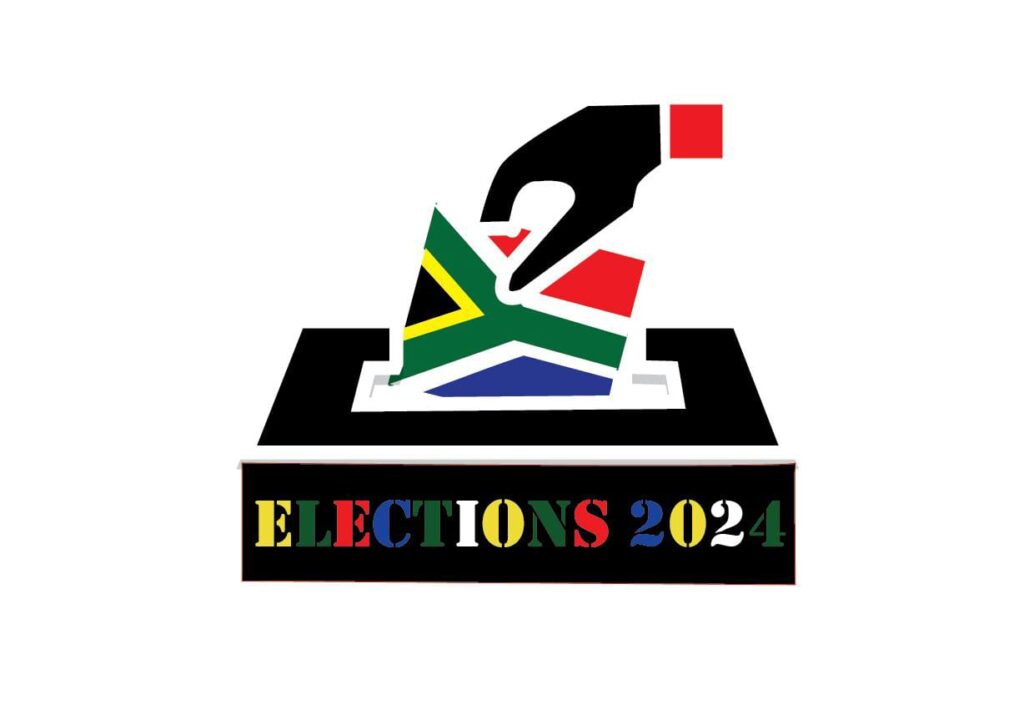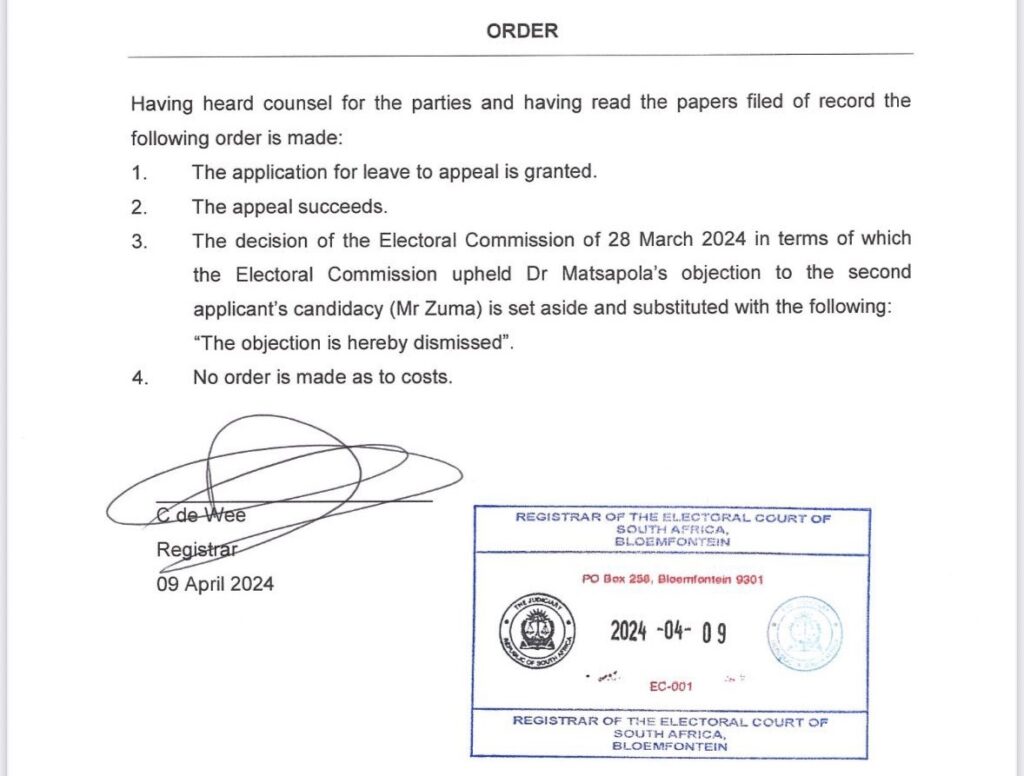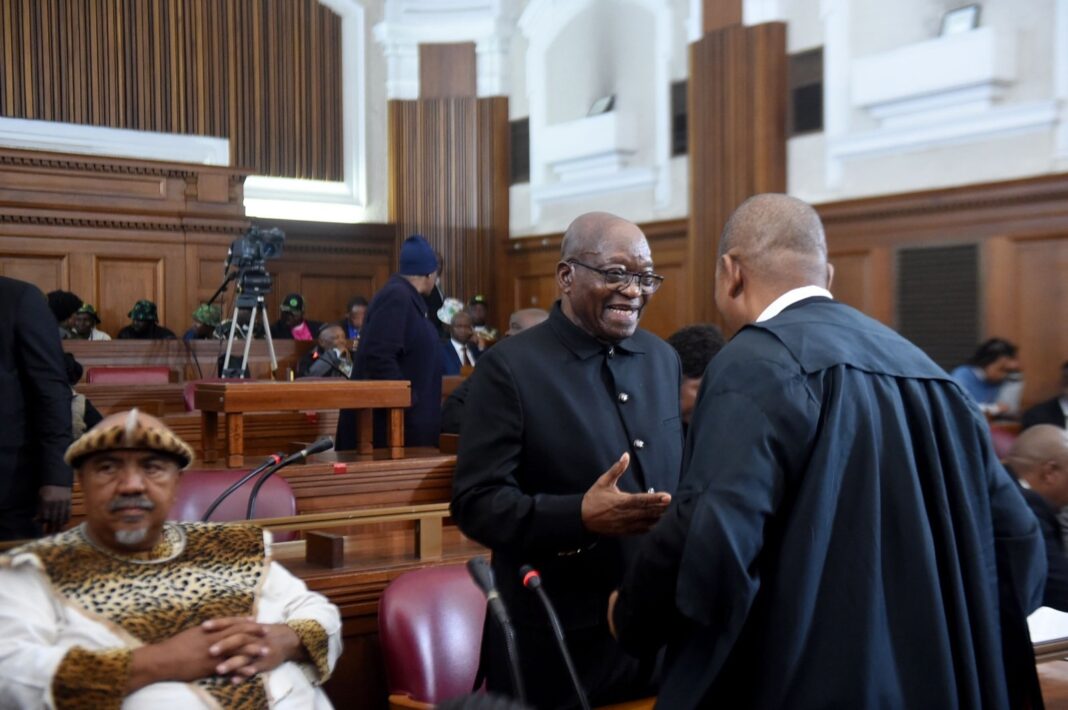Johnathan Paoli
The Electoral Court has dismissed the IEC decision to bar former President Jacob Zuma from the candidate list of uMkhonto weSizwe (MK) party which would have stopped him from contesting the 29 May National General Elections.
Now Zuma can stand for elections as the court’s judgement on Tuesday, upheld the appeal by the MK party and, dismissed the objection placed within the IEC and reversed the barring of Zuma as a candidate in the upcoming elections
The MK party launched the appeal in the court in Johannesburg on Monday, claiming irregularities in both the commission as well as the Constitutional Court which sentenced Zuma in 2021.

The IEC last week confirmed that an objection to Zuma’s candidacy was received and upheld by the commission ahead of the elections, with Chairperson Mosotho Moepya saying one of the grounds for disqualification is if a candidate has been convicted of an offence and has been sentenced to more than 12 months’ imprisonment without the option of a fine.
Zuma was previously sentenced to a 15-month prison term by the Constitutional Court in 2021 after being found guilty of contempt of court.
Legal counsel for the MK party, Dali Mpofu argued that Zuma could contest the elections, due to the presidential remission which effectively reduced the sentence to three months, thus falling short of the requirement of section 47 of the Constitution.
“What we are saying is that if he was pardoned, then this argument would not stand, but the effect of remission has been clearly defined as to cancel the sentence or to set aside the sentence. In this case, the ultimate sentence, as a result of the remission, is three months. Once the sentence is set aside, whether as a result of remission, it is set aside,” he said.
Mpofu told the court that it should not be easy for the IEC to receive “some piece of paper” and remove him from the list and that the rights of Zuma as well as the people who support him were being disenfranchised, insinuating that the commission was overreaching and encroaching on the domain of Parliament.
“This is a very important case in South Africa. We are dealing with a person who fought for this country and we are dealing with the rights of people who may want to vote for the uMkhonto weSizwe Party.
Mpofu argued that if Zuma is not allowed to remain on the list, MK party supporters would be deprived of their right to vote for a candidate.
“The commission’s duty is to manage elections not determine the electorate, it must decide the how of voting, not the who,” Mpofu said.

He reminded the court that the former leader was not allowed to appeal his sentence after he was found guilty of contempt of court and sentenced to 15 months behind bars and said the decision of the IEC before the announcement made on 28 March 2024 never furnished Zuma’s party with the reasons for the objection against him, “had no valid reasons to violate the political rights of Zuma” and the IEC, not just Judge Dhaya Pillay, were legally excluded by bias from deciding the matter.
Mpofu argued on the nature of Zuma’s conviction and jail time and drew the distinction between a pardon and a remission.
“Zuma was not pardoned. A pardon is where you forgive a conviction and sentence. Remission is where you only forgive a sentence,” he said.
Zuma’s legal counsel argued that the IEC had no authority to exclude the former president as a candidate using Section 47 of the Electoral Act, and said that it contravened Section 9, in which no member of the commission may, whether directly or indirectly, in any manner give support or oppose any party or candidate participating in any election.
However, counsel for the IEC Thembeka Ngcukaitobi argued that it did not matter how Zuma was convicted for contempt of court, what mattered was that he was found guilty.
Ngcukaitobi argued that Zuma was found guilty of a crime of contempt and said that if there was an appeal by Zuma, it would have to be taken into account, seemingly forgetting that appeals from the Con Court are not allowed.
He said that the court should not conflate this with the period actually served and the date of his release, and that the remission did not change the sentence, but simply determined the period of release.
Ngcukaitobi said President Cyril Ramaphosa’s proclamation on remission was never to undo a sentence imposed.
“The reason they put it at 12 months is because it is a signal of the seriousness not only of the conviction but of the offence, and the reason they also make it clear that there should be no option of a fine because what the constitutional drafters are trying to tell us is that serious law breakers should not be lawmakers,” Ngcukaitobi said.
He argued the IEC had the power, derived from the Electoral Commission Act and the constitution, to make rulings, and said the fact that the MK had marched to its offices earlier in February indicated that the former president and his party knew “of the substance of the likely objections.
MK party spokesperson Nhlamulo Ndhlela last week said they hope that the court is “influenced by nothing else but the facts of the case.”
“We challenge the legality and validity of the IEC’s decision, asserting that it was made without proper jurisdiction, influenced by bias, and based on flawed interpretations of the law.
“We remain steadfast in our pursuit of justice and will spare no effort in defending President Zuma’s rights as the only South African post 1994 to be jailed without a trial,” Ndhlela said.
On receiving the news UDM leader Bantu Holomisa took to social media platform X, and likened Zuma to President Lula da Silva, who emerged from prison to win elections as president of Brazil.
INSIDE POLITICS

